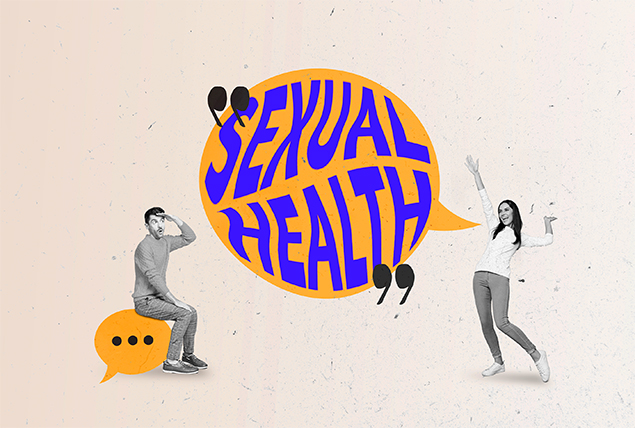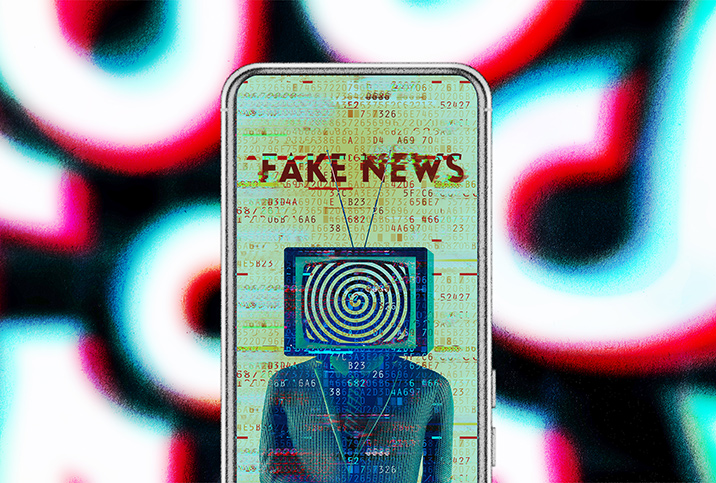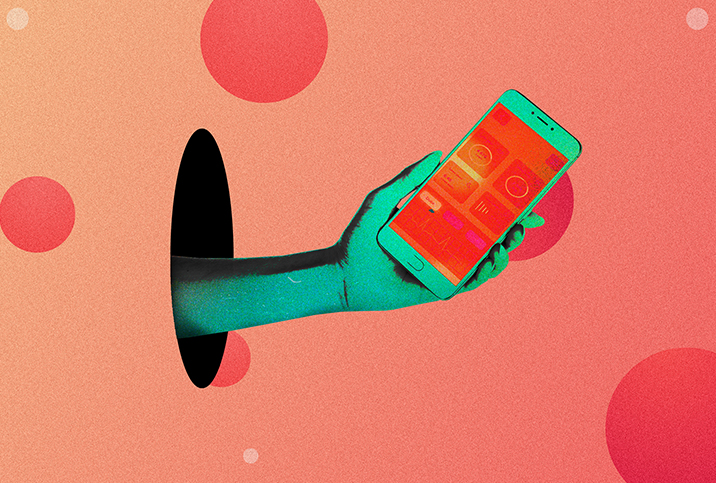5 Ways You Can Vet Advice About Sexual Health Online

"Is this syphilis? PLEASE HELP," user Difficult-Parsnip508 posted to r/STD, a page on Reddit that's devoted to everything and anything related to sexually transmitted diseases (STDs).
"I'm female; my last exposure was approximately three weeks ago. I don't have any rashes on my hands/palms or my foot/soles. It's this rash on the top of my right shoulder. It's been here for the past 3 days and hasn't gotten better or worse. For complicated reasons, I can't go to the doctor. I'm freaking out and I will be grateful for any help."
A photo depicting her back and the small, brownish-red bumps accompanied the text.
Within hours, the root vegetable-loving (or hating?) original poster had received several replies. Most suggested it looked like acne or maybe an insect bite. Several encouraged her to see a doctor or get an at-home test.
One, luckychatms130, railed against the dangers of sex outside of marriage, advising never to trust a partner who is "already fornicating." They also suggested getting tested.
Difficult-Parsnip508's is one of the countless similar posts to the r/STD forum that seek advice on everything from suspicious bumps to confusing test results and anxiety-inducing one-night-stands.
Research into online health advice
A 2019 study published in the Journal of American Medicine (JAMA) collated data from thousands of these posts published between 2010—the year r/STD was created—and 2018. Of those, about 58 percent of all posts on the page explicitly sought crowd diagnoses, the study authors reported, with about 38 percent sharing (often graphic) photos of their symptoms. Like Difficult-Parsnip508, nearly 90 percent received replies and advice, usually within hours.
Some of those responses were medically sound. Most, however, were "wildly inaccurate," the study authors explained in a press release. They specifically cited the "crowd's" astonishing degree of faith in apple cider vinegar, which is not, for the record, a cure-all.
Perhaps more concerning, many respondents gave advice that directly contradicted doctors' recommendations, sometimes with potentially dangerous implications and outcomes.
The World Wide Web is a powerful tool for education and empowerment—but it's also home to content such as 'how to make a DIY condom'
Of course, it's not just Reddit users doling out dubious advice. A 2021 systematic review published in the Journal of Medical Internet Research examined 69 studies on a variety of health topics, from smoking to the HPV vaccine. Researchers found the prevalence of health misinformation was high across multiple platforms and subject areas.
A 2022 systematic review of 31 previous studies published by the World Health Organization (WHO) yielded similar results. The WHO report indicated such false information negatively affected people's health behaviors.
Amid a nationwide epidemic of sexually transmitted infections (STIs) and ever-changing reproductive healthcare laws, medically accurate information and competent services may be more important than ever. Yet, due to various barriers, from shame and stigma to a lack of transportation, tens of thousands of people are turning to their fellow internet users instead of licensed primary care doctors or health services.
If you've ever been online, you know why that might be a problem. The World Wide Web is a powerful tool for education and empowerment. But it's also home to content such as "how to make a DIY condom" or "tighten your vagina with ice." Neither of those things works, in case you were curious.
It's not always easy to determine what's legit.
We spoke with experts to get their take on what's behind the crowd-diagnosis phenomenon and how to sort fact from fiction when researching health topics online.
Why are people seeking crowd diagnoses?
It's understandable why people might be motivated to look online for sexual health answers and diagnoses from strangers, said Ceara Corry, M.S.W., L.C.S.W., a sex educator, sex and relationship therapist, and owner of The Naked Truth in Raleigh, North Carolina.
"Adequate and supportive healthcare is not always accessible, especially for marginalized groups like people of color, queer and trans folks, or people with disabilities," she said. "I've even experienced this personally."
In 2016, Corry told her gynecologist she suspected she had polycystic ovary syndrome (PCOS). She had researched the condition online and had characteristic symptoms and a personal and family medical history that made her more susceptible.
Instead of taking her concerns seriously, the doctor minimized her symptoms and blamed them on her weight, Corry said. It took her nearly two years to receive a diagnosis. Research, including a 2019 review, indicates Corry's experience is not an uncommon one.
The stigma around topics such as sexual health can make people feel embarrassed or ashamed to talk face-to-face with a professional, Corry noted, whereas online forums provide a shield of distance and anonymity.
Logistical hurdles such as cost and lack of transportation may also prevent some people from seeking in-person care, said Rosalyn Plotzker, M.D., M.P.H., an assistant professor in the University of California, San Francisco department of epidemiology and biostatistics.
"From the perspective of someone who is worried about an STI, asking something online can be easy, free and anonymous, and multiple replies could be used to get a 'consensus.' I can see the appeal," Plotzker said. "The only problem is that the information isn't necessarily reliable. There's no opportunity for a physical exam or lab tests, and the responders are not accountable since there isn't a provider-patient relationship. So there is a major risk for misinformation."
That misinformation can lead to various harms, from ineffective treatments to unintended pregnancy and STI transmission, noted Sarah Melancon, Ph.D., a Fullerton, California-based sociologist and clinical psychologist at Sex Toy Collective. Study authors agreed, noting that misdiagnosis can have a ripple effect, impacting not just the poster, but millions of viewers who believe they may have a similar condition.
The ramifications can be substantial and potentially life-threatening.
"STI infections may worsen with the wrong treatment. For instance, untreated chlamydia can cause pelvic inflammatory disease," she said. "Syphilis or HIV may progress to an advanced stage, which has greater negative effects and is harder to treat and in the long term can lead to death."
As for why approximately 20 percent of the posts included in the study were seeking a second opinion, people might doubt a clinician's capability or feel their provider didn't listen or take them seriously. That's according to experts such as Danae Maragouthakis, M.B.B.S., M.P.H., an emergency medical doctor in Oxford, England, and a co-founder and CEO of Yoxly, a provider of at-home STI and sperm testing kits.
They may also have felt embarrassed or anxious about revealing certain pertinent details and worried about the significance of omitting them. Receiving a diagnosis, particularly a serious one, can be devastating and some folks might seek solace in alternative answers, even those that are inaccurate.
"On one occasion, a patient had received an HIV diagnosis but turned to a crowd diagnosis to be convinced the doctor was wrong," said John Ayers, Ph.D., one of the study's co-authors and an epidemiologist and adjunct professor at the University of California, San Diego, in a statement. "People, when faced with life-altering information, often want to delude themselves and, in some cases, they are finding it on social media."
5 tips for vetting advice about sexual health online
Experts stressed that while seeking health information online can be a gamble, it isn't inherently a bad idea, especially because education and even self-diagnosis can be empowering.
Here are five strategies you can use to get the most out of the advice you find online.
1. Define your goals
First, determine what you're hoping to gain from your search, Corry suggested.
Are you investigating whether a diagnosis matches your symptoms, or do you want to know how others with similar experiences have handled their situation? Both are valid but have different search criteria.
Being clear about what you're seeking can help rule out unhelpful sources, she explained.
2. Check credentials
There are many 'influencers' who simply hold a certificate or bachelor's degree in their area of focus, while others are just self-deemed 'sexperts.'
"There's nothing wrong with individuals who want to speak about sex on the web, but take their information with a big grain of salt," Melancon said. "Certainly, not all M.D.s or Ph.D.s are going to agree on every topic—that is laughable, actually—but typically, their perspective will be supported by theory and data."
If you're not in the habit of reading the About Us sections on websites you visit, it's time to start. These pages can provide valuable information such as who funds the site, where they're getting their information and who's fact-checking it (if anyone), Corry said.
If well-known, reputable organizations and people with nursing and medical degrees are involved, that's a positive.
3. Take extra precautions with controversy
If a topic is controversial, don't accept one perspective as truth, even from credentialed sources, Melancon said.
"Compare and contrast. Look at the content you think you won't agree with to get a broader picture," she added.
For example, if you're uncomfortable with your pornography use, coming across the NoFap movement might seem like the answer, as it treats porn use and masturbation as addictions and leans heavily on self-control as treatment. However, research suggests it is ineffective.
"Participants experience strong negative emotions including shame, worthlessness and even suicidal ideation after 'relapses,'" she added. "Is that the outcome you're really wanting?"
Some principles and information are subject to debate within the medical community, Melancon pointed out. In that case, it isn't a flaw but part of the scientific process. Examples include the potential safety risks of hormonal contraceptives or the effects of pornography on mental health.
4. Go directly to the source
When websites and content creators use terms like "research indicates" without citing their source, it's a red flag. That said, experts pointed out that it's important to note that not all research is equal.
"If you want to really geek out, dig deep," Plotzker said. "If an article mentions a study, you can look up that study on Google Scholar and read the abstract. Some articles are also fully available online."
When reading the abstract, experts recommend checking how many people were involved in the study and whether they represent your demographic. For example, information gleaned from a study conducted on 30 male-identifying people in their 20s may not directly translate to you if you are a postmenopausal woman.
5. Corroborate with expert sources
When in doubt, experts suggest corroborating information you find through influencers or other uncertain sources with more surefire resources, like the Centers for Disease Control and Prevention (CDC) or Mayo Clinic. You can also message, email or call your local health clinic to ask if a specific piece of information is correct or whether a certain treatment is one they're familiar with and condone.
Many of those clinics have nurse helplines and telehealth options that enable you to speak with a licensed provider without an in-person appointment.
"If you find something online that impacts your health directly, ask your healthcare provider about it if you can. There are ways to communicate with your provider through online patient platforms," Plotzker said. "Or go in and have an old-fashioned, in-person discussion with someone who is a healthcare provider. You can show them the webpage on your phone—it's a great way to confirm what you have read."
The bottom line
The internet and social media are both a blessing and a curse, experts agreed. On one hand, the ability to connect, organize, disseminate information and promote causes, such as HIV prevention and family planning, is incredibly valuable.
"But it's a double-sided coin. With all of the benefits, there is the equal and opposite aspect of misinformation, the perpetuation of fear and stigma, and resources available online that have not been vetted," Plotzker said. "That can be very difficult to navigate."
Ultimately, Plotzker recommended viewing the internet as a complement—don't consider it a substitute—to traditional medical care as the best strategy.
"I do think patients understand their own bodies better than anyone else. If someone has had a condition in the past and then they have very similar symptoms again, it's reasonable for them to think that history could be repeating itself," Plotzker said.
All assumptions, though, have limitations.
"A physical exam and medical tests that can confirm a self-diagnosis are important as an objective way to know for sure what is happening, especially since it might be something else," she noted. "And only then determine the best treatment course."


















